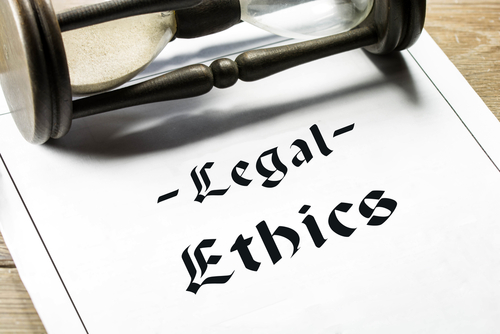Lawyer who used gay slur to refer to judge should get stayed suspension, opinion says

Image from Shutterstock.com.
A Colorado lawyer should receive a stayed suspension for referring to a judge as a "gay, fat, f- -" in an email to two clients, according to an opinion by the judge appointed to preside in discipline matters.
Judge William Lucero, the presiding disciplinary judge, ruled that Denver lawyer Robert E. Abrams should receive a three-month suspension that would be stayed if he successfully completes an 18-month probation period. The Volokh Conspiracy covered the Feb. 12 opinion, which was recently posted on Westlaw.
Abrams said he is appealing the ethics decision, which he considers an example of political correctness. He never said gay judges can’t serve on the bench, and his comment did not show bias, he said.
The clients, a married couple, were represented by Abrams in a construction contract lawsuit against their builder, according to Lucero’s opinion. Abrams secured a favorable outcome for the clients—a $200,000 default award plus attorney fees, secured from a judge who replaced the one Abrams had criticized.
The couple thought the award was uncollectable, and they reported Abrams to disciplinary authorities when the relationship soured.
Abrams charged the husband and wife for the time he spent responding to the disciplinary matter, then withdrew the bill 13 months later, according to Lucero’s opinion. Abrams told ethics authorities that the invoice was mistakenly sent to the couple.
Abrams had argued that his use of the word “f- -” was not a matter of public concern warranting First Amendment protection.
Abrams’ problems with the judge began during a 2016 case management conference in the couple’s case, according to the opinion. Abrams said the judge yelled at him, and he found the judge to be “brash and arrogant and condescending.”
Abrams outlined his problems with the judge in an email responding to the wife’s questions. He called the judge an “ass” and wrote, “The judge hates me. It happens, it’s not the first time. I probably remind him of someone who beat him up [when he] was a fat kid and now that he’s a big fat judge he gets even w/ the bullies. Maybe he just hates Jews, who knows?”
Answering another question, Abrams wrote, “I was getting yelled at by Fatso. The judge is a gay, fat, f- -, now it’s out there.”
Abrams had argued that his use of the word was intended to insinuate only that the judge was a “weakling who was picked on by bullies,” according to the opinion.
Abrams told ethics regulators that he was frequently picked on while growing up in suburban Chicago, leading to his ethos of, “You come on me, and I’m coming right back.” He sees himself as a “Chicago street fighter.”
He was himself called a “f- -” in high school, Abrams testified. “I actually broke that kid’s nose for doing that.”
He highlighted his ties to the LGBTQ community, including his representation of the largest LGBTQ nightclub in Denver. He has no bias against gays, he testified.
He also said he regrets the email, and the language was unprofessional and inappropriate.
He wanted to testify, he said, because he thinks that people have misused their authority to enforce standards of political correctness and paint him as a bigot.
“I came down here to clear my name that I’m not a bigot. That’s why I’m here,” he testified.
Abrams did not have any history of discipline.
Lucero concluded that Abrams used an excessive fee when he charged the clients for time spent responding to the disciplinary matter.
Lucero’s opinion also found that Abrams violated a disciplinary rule barring lawyers from engaging in conduct intended to appeal to or engender bias while representing a client.
“The legal regulation system cannot—and should not attempt to—police lawyers’ private beliefs and innermost thoughts,” the opinion said. “That inner sanctum is beyond the reach of our ethical rules. But the legal regulation system does—and should—set minimum standards for proper conduct when lawyers represent clients and in that role serve as intermediaries between clients and the legal system. This rule does not regulate bigotry; it regulates behavior. … In his private life, [Abrams] is free to speak in whatever manner he chooses. When representing clients, however, [Abrams] must put aside the schoolyard code of conduct and adhere to professional standards.”
The opinion said a stayed suspension would be most effective in encouraging Abrams “to learn and practice restraint.”
The Volokh Conspiracy raised questions about the decision.
“Whatever the value of preventing lawyers from insulting witnesses, parties, and the like to their faces, it seems hard to see a sufficient justification for preventing lawyers from insulting judges, witnesses, or others in private communications to their clients, whether the insults are biased or not,” wrote Eugene Volokh, the author of the blog post and a law professor at the University of California at Los Angeles.
Abrams told the ABA Journal that his appeal of Lucero’s decision has been accepted by the Colorado Supreme Court. The evidence at the ethics trial did not support Lucero’s conclusions, he said.
Abrams says his use of the word “f- -” was a reference to the judge as a weakling who probably got beat up in high school, not as an expression of bias. Abrams says he was telling his client that the judge probably didn’t like him because he reminded the judge of bullies who beat him up.
“In my opinion, there was absolutely no clear and convincing evidence from the exhibits at trial that I exhibited any bias whatsoever,” Abrams says. “The whole thing is just obnoxiously political correctness.”



